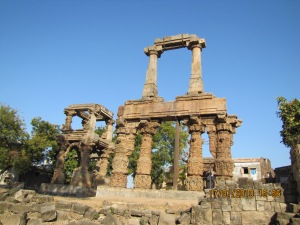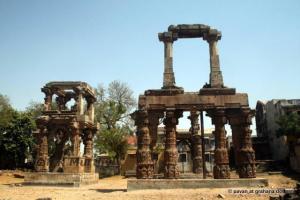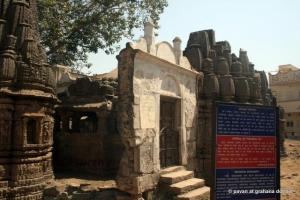“Where the hell is this place?” I muttered to myself with irritation. This was the second time I had stopped to ask for directions.The answer was “No” again. These people too had not heard of the place. One man asked me to describe it. I told him that I was looking for the old mandir on the banks of the river. He said that there was nothing like that anywhere. I kept driving ahead in those narrow lanes with some trepidation. The road was barely wide enough for my car. If I encountered another car coming from the other way or something worse like a dead-end, I would have to reverse all the way back. That’s not an easy thing to do with an Innova. The day had been good. The family was in a good mood and we had covered a lot of destinations in the day. This mandir was to be the final stop before we headed back home. My sense of directions and reconnaissance done on Google maps in the previous nights told me that we were close. It would be frustrating to leave without checking this out, especially after spending this effort on search. I continued with stubborn determination.
I stopped again to ask for directions. This time I was lucky. “Yes. You need to continue on this road and you will find it almost at the end of this road.” As I started trudging along, my wife commented “ It doesn’t seem to be a popular place. Nobody seems to be going along this road except us”. I too had noticed it. But then, after a couple of minutes we were finally there. We reached a fenced enclosure approximately 100 feet wide with bit of undergrowth and one tree. I could also see the huge carved pillars and some other structures within. It looked like site of a demolition with big stones lying all around the place. There was a familiar blue board from ASI identifying it as a structure of historical importance. But, it was an anticlimax. There was simply nothing like a temple out there. I could not see any river too. The place was surrounded on all sides by houses. We had some curious stares from within those houses. It didn’t seem like a lot of people visited this place. A thick smell of dung filled the air. We had started the day with a visit to the magnificent sun temple at Modhera. This certainly was not what we were prepared to see.
There was simply no regular way to get in. I went around and jumped in though an opening. Then I noticed four people inside. Couple of them looked like cops in their half-undressed Khaki uniforms. One of them carried a rifle. Others were probably ASI employees. They were resting on charpoys. There was a stove lying around and dirty tea cups all around. When they noticed our arrival, it was evident that we were not welcome. A man came up to me and said “You can’t come in. It’s not allowed.” “I just want to look around. We are tourists” I replied. He took a long look at me and then at my wife still sitting in the car. “Where are you from?” he questioned. “Bangalore, Karnataka” I said hopefully.
“Which department do you work for?”
That was an odd question. But, I didn’t give it a thought. I explained the nature of my work in four simple words “I work in IT.” That seemed to do the trick. He smiled.
“Okay, Sir. Come in and look. But, strictly no photography.”
I nodded and kept my camera on the charpoy. I gestured to my wife to follow me. Looking up, I saw a magnificent Torana rising nearly 20 feet into the air around 60 feet ahead of me. That alone seemed worth the effort we had put in reaching here. As I scanned around, I could see the suddenly see the remnants of a large mandir complex. There was even a Shiva Linga in a small mini shrine. There were huge stones, carvings and pieces of pillars lying all around the place. My wife was now inside too. It didn’t take more than ten minutes to scan the entire complex. As my wife loitered around, I came back to chat with the men. They were distinctly friendly now. I started talking with the ASI man.
“What’s the deal with so much security?”
“Oh! You don’t know the story here. This is a sensitive place. This whole place where we are sitting was the Jami Masjid where around 150 people would pray on every Friday. Then, one day, the masjid wall fell down due to a heavy downpour. It revealed all the mandir structures ,Shiv linga and the nandi contained within its walls. The management of the masjid simply wanted to brick it up again. As the news spread, the Hindus woke up suddenly and claimed the mandir. It was always known that an ancient mandir stood at this spot. But the entire locality surrounding this place is Muslim. ”
“The town burned for 15 days in riots. The matter went to courts. Prayers had to be stopped on both sides and entry became restricted to avoid further escalation. That’s why we are here with cops. To prevent any problems! “
I changed the topic to the ASI person’s family and career. My wife was bowing in front of the Shiva Linga. I noticed a few flowers, Kumkum and agarbattis lying around the shrine.
“I was part of the dig at Dholavira. I have worked under many big officers. The officer in charge of this mandir was a south Indian Brahmana .He was also from your state I think. It was because of his efforts that the rest of the mandir complex was unearthed. When the department started digging in the courtyard, we discovered the remains of the mandir there too. If not for him, the government would have hushed up the whole thing.”
I queried “Didn’t the Muslims praying here and the elders managing the masjid never notice the idols and pillars with the walls. Were they aware of it at all?”
“Of course, they knew it. It must’ve been in their plain sight every time they came in here. But, so what ? How many masjids have been constructed over mandirs? The government offered an alternative location for constructing the masjid. But they refused. The matter is still in the court. Till it gets resolved, we remain here. ASI wanted to acquire all the remaining houses around here for the excavation. There is literally an architectural treasure here waiting to be discovered. But the people are not willing to cooperate and government is afraid. If not for our old sahib, even all of this would still be under the earth.”
I gently broached the topic “Can I take a few quick snaps? Only if you don’t mind.”
He said “I am allowing it only because you are a government officer. But be discreet. People may be watching us.”
I wondered how I had suddenly become a government officer. Meanwhile, my wife came over and joined the conversation. Another man courteously offered a glass of water to her. I took my camera out and quickly took pictures of the Toranas and the other tall structure that looked like a Mantapa with massive pillars. My wife was telling the ASI man that we had visited Modhera earlier. He was now explaining that both of these temples were built by the same dynasty, the Solankis.
“Who destroyed this temple and built the masjid?” She asked.
“Some people say it was the Mahmud of Ghazni. Others say it was Ahmed Shah. Who knows?” he trailed off.
“Who is doing the pooja to the Shivji at that little shrine over there?” I asked.
“I do that. Nothing fancy about it. I light a lamp and offer some flowers. The government doesn’t care. But, the Bhagwanji has manifested his presence here again after centuries. It’s our dharma to do this much at least.”
As I took a last look at the Toranas and their intricately carved pillars, I could imagine the magnificent structure that must have stretched all the way to banks of river Saraswati flowing 300 feet away just beyond the houses. I thanked them and prepared to leave.
He suddenly turned back and asked “How long have you been working in Income tax?”
I almost laughed “No. I don’t work for income tax department. I work in an IT company. We work on computers.” He nodded and walked away. I took one look at the remaining part of whitewashed wall of the masjid. It seemed to have been broken apart by the remains of temple within in an explosive jailbreak attempt.
As I drove back to the highway, my mind was raging against the injustice of it all. The invader’s sword had shattered this temple and our ‘secular’ polity still wants to wish away the inconvenient truth. Yet, the spirit of Dharma reveals itself in flash like that fateful downpour that washed away the wall. Just before reaching the highway, I parked near a small store. I needed to buy some water. I told the shop keeper that I had just been to see Rudra Mahalaya. I asked him what he thought about it. He said “Every masjid here sits on top of a temple. It’s the same whether it Ayodhya, Kashi or Mathura. Even the Bhadra Masjid in Amdavad was a temple once. But, what can be achieved by driving the people away from their homes in which they have lived for generations. Where will they go? We all know that there is the mandir remains under their houses. The masjid is no longer there. That is enough. Let them live in peace.”
——————————————————————————————————————————————————————–
Sidhpur is a city in Patan district of Gujarat. The Saraswati River (namesake of the mythical lost river) flows through the town. Siddhiraja Jayasimha, the Solanki ruler built this city. He also built a magnicificent temple for Shiva on the banks of River Saraswati – the Rudra Mahalaya. The Solankis also built the stunning Surya mandir complex at Modhera. The city is very close to Patan which used to be the capital of Solankis. Sidhpur is also known as Matru-Gaya. It is considered the holiest spot for Hindus to perform their mother’s shraddha. It is also famous for it elegant Dawoodi Bohra havelis.
Rudra Mahalaya was a complex of 11 shrines dedicated to ekadasha Rudras. Originally it covered an area of 100 x 66 mtrs. The central building itself occupied an area of about 50 x 33 mtrs. The mighty pillars of this temple are the tallest so far known in Gujarat. The temple was attacked by Allauddin Khilji’s armies just like the sun temple at Modhera. But, it was Ahmed Shah (Ahmedabad is named by him) who destroyed it completely and built the Jami masjid in its place using its western sections. For a very comprehensive and authentic version of the Sidhpur dispute, please click here.



You must be logged in to post a comment.